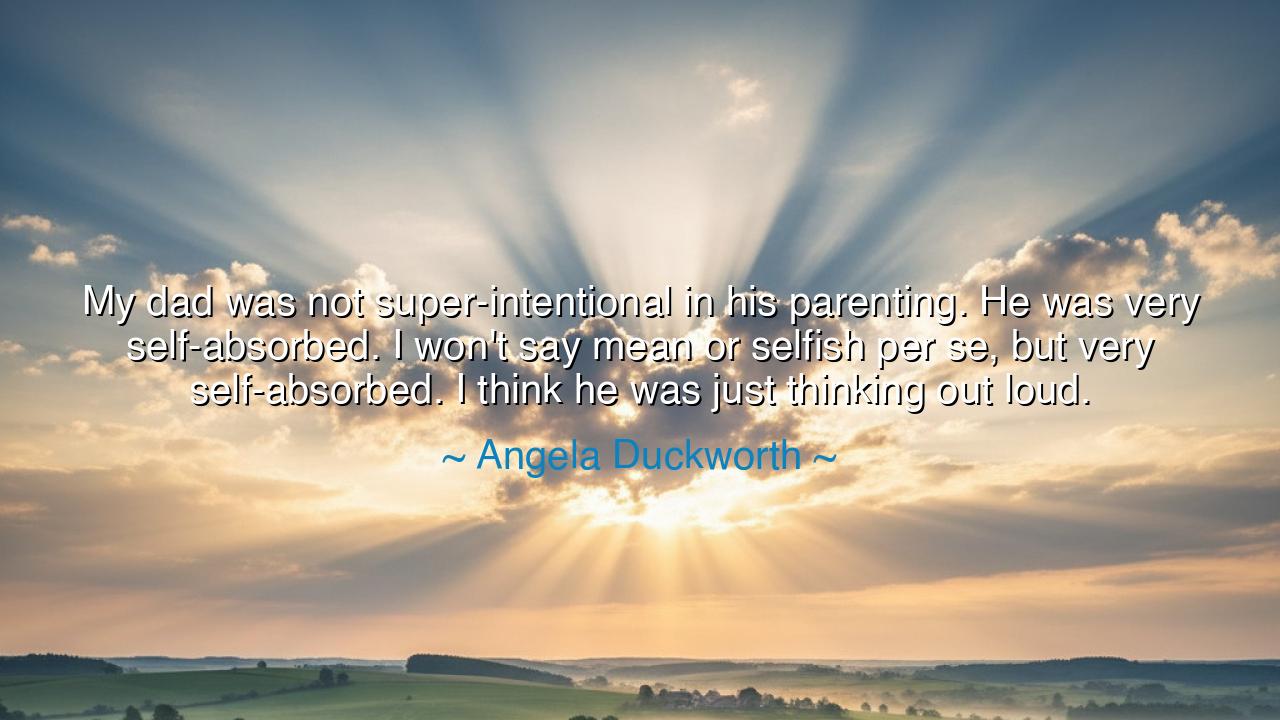
My dad was not super-intentional in his parenting. He was very
My dad was not super-intentional in his parenting. He was very self-absorbed. I won't say mean or selfish per se, but very self-absorbed. I think he was just thinking out loud.






Hearken, O seekers of wisdom, to the candid words of Angela Duckworth, who reveals the subtle truths of parenting and human imperfection. She speaks of a father whose guidance was not marked by deliberate intention, but by the wandering reflections of a self-absorbed mind. Not cruel nor selfish in intent, he spoke as one thinking aloud, caught within his own consciousness, yet his influence left impressions—both faint and profound—upon the formation of character and the understanding of the world. In this reflection lies an ancient lesson: even imperfect guardians shape the hearts and minds of their children, and awareness of these imperfections can become a source of learning and insight.
The origin of this insight lies in the recognition that parental influence is often complex, subtle, and unintentional. Across the annals of history, children have absorbed the behaviors, attitudes, and temperaments of those who raise them, whether consciously or unconsciously. Ancient philosophers and chroniclers observed that the household is a crucible not only for deliberate teaching, but for the imprinting of character through observation, imitation, and response. Duckworth’s words echo this enduring truth: parenting is rarely perfect, and yet the legacy of influence endures in nuanced and sometimes surprising ways.
Consider the life of Benjamin Franklin, whose father, Josiah Franklin, was a man of practical skill and industriousness, yet often preoccupied with his own labors and concerns. Though not always intentional in moral instruction, Josiah’s manner, diligence, and engagement with daily life left indelible marks upon young Benjamin, who absorbed lessons of industry, curiosity, and resilience through observation as much as through explicit teaching. In this, Duckworth’s reflection finds a historical parallel: children inherit not only guidance, but also the rhythms, dispositions, and imperfections of their parents.
The emotional resonance of Duckworth’s words is striking. To recognize that a parent may be self-absorbed or inattentive yet still formative is to confront the complexity of love, influence, and human limitation. The child perceives both the absences and presences of the parent, learning resilience, discernment, and independence in response. The task of the modern guardian, then, is to understand that influence is not merely in instruction, but in example, temperament, and the unspoken rhythms of daily life.
In practical terms, this insight teaches that awareness of parental imperfection can be transformative. One may study the behaviors of their parents—not with judgment alone, but with curiosity—to discern which qualities to emulate and which to modify. Historical examples, from the reflective practices of Renaissance thinkers to contemporary psychologists’ accounts, reveal that self-awareness in parenting and in response to parenting allows the cycles of influence to be guided toward growth, understanding, and moral integrity.
Duckworth’s reflection also carries a moral and heroic dimension: to perceive imperfection without resentment, to extract wisdom from the unintentional, and to shape one’s own path with intentionality is a courageous undertaking. It transforms the child into a deliberate guardian, capable of acting with foresight, empathy, and purpose, in contrast to the unconscious patterns of the previous generation. In this, we see that the work of parenting is not merely about imitation, but about conscious, ethical engagement.
From this understanding arises a practical lesson: reflect upon the influences of your upbringing with honesty and clarity, recognizing both the intentional and unintentional lessons imparted. Embrace the imperfections of those who raised you as opportunities for learning, and cultivate deliberate, thoughtful approaches in your own parenting or mentorship. In doing so, the legacy of influence becomes conscious, guided, and enriched by insight rather than limited by past lapses.
Thus, the teaching of Angela Duckworth endures: even self-absorbed, inattentive, or unintentional parenting leaves its mark, and awareness of these influences empowers deliberate growth. Let all who bear the responsibility of guiding others approach it with reflection, mindfulness, and courage. In doing so, they transform the imperfect legacy of the past into a conscious, purposeful shaping of character, nurturing resilience, wisdom, and virtue across generations.






AAdministratorAdministrator
Welcome, honored guests. Please leave a comment, we will respond soon